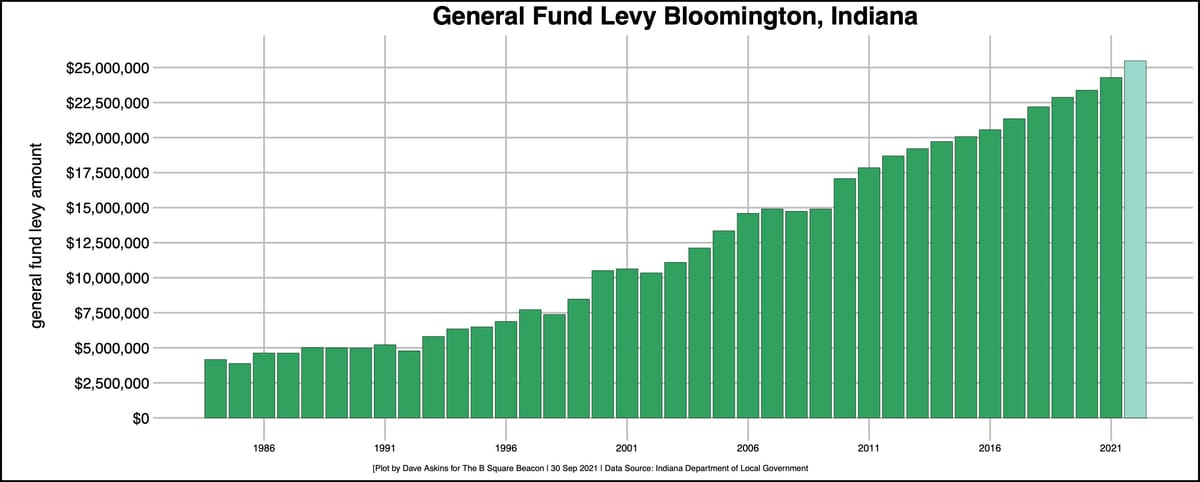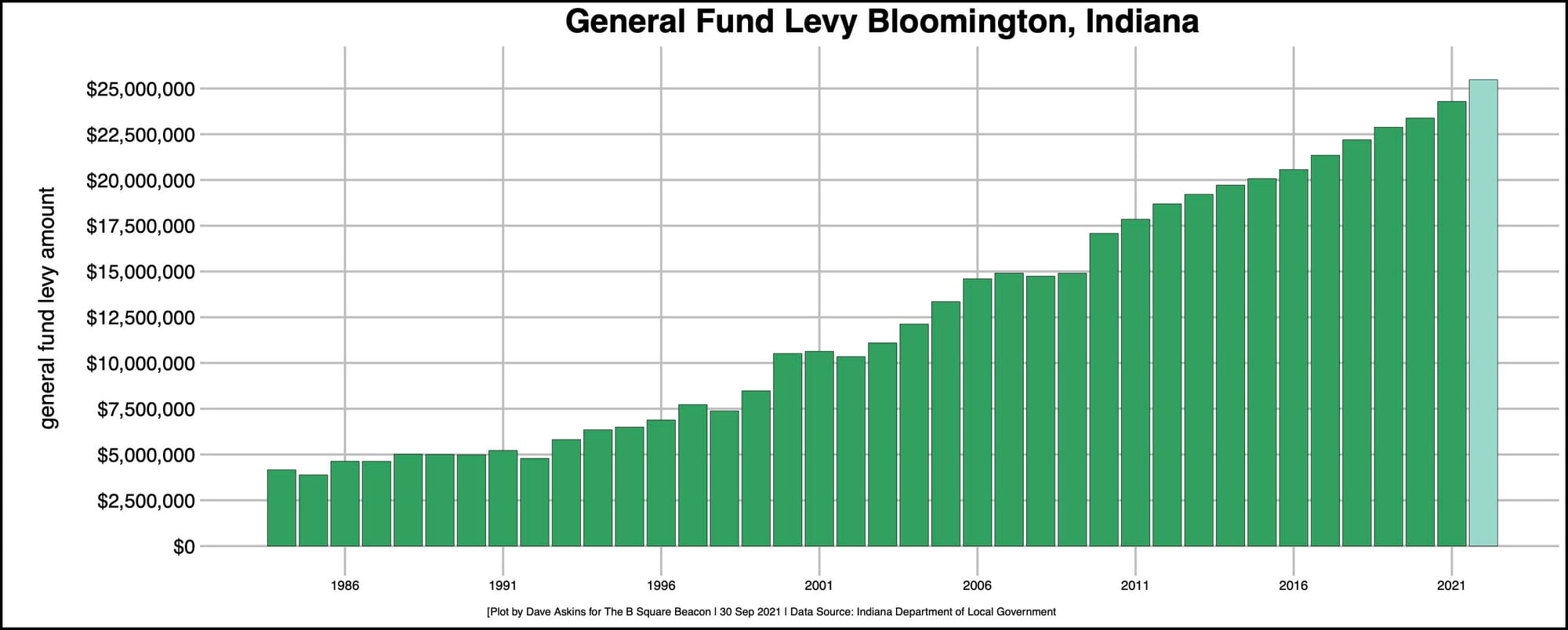Rumblings among Bloomington city council members about voting against 2022 budget


Climate action, non-motorized transportation, and police pay are current sticking points between Bloomington’s city council and mayor John Hamilton, as the 2022 city budget process builds towards a mid-October council vote.
At their committee-of-the-whole meeting on Wednesday, Bloomington city council members reviewed each of the legislative items that collectively make up the annual budget.
Three appropriation ordinances cover different pieces of the city’s finances—the city’s basic budget, city of Bloomington utilities, and Bloomington Transit. The other three items are salary ordinances for different categories of employees—police and fire; other city employees; and elected officials.
The final 2022 budget, which reflected just a few adjustments since the departmental hearings in August, totals around $107 million.
Based on the straw polls they took on Wednesday, some councilmembers will be voting against the appropriation ordinance for the basic budget—unless they see some concessions from Bloomington mayor John Hamilton.
Those concessions would need to be made between now and Oct. 13—that’s when an adoption vote is scheduled.
In Wednesday’s straw poll, the key ordinance that sets the tax rates and levy for 2022 got an indication of support from just three of nine councilmembers: council president Jim Sims, Ron Smith, and Susan Sandberg.
Saying they do not currently support that ordinance were Matt Flaherty, Kate Rosenbarger, Steve Volan, and Isabelle Piedmont-Smith. Not giving an indication either way were Sue Sgambelluri and Dave Rollo.
Approval of the appropriation ordinance setting the tax rates and levy takes just a simple majority, so it could be passed with just five votes.
Failure to adopt the appropriation ordinance setting a new tax levy would cost the city of Bloomington more than a million dollars this year.
What could lead individual councilmembers to vote against adoption of the budget?
Submitted on July 1 to the administration by Wednesday’s four non-supporters was a list of 13 points. Their hoped-for concessions evolved from that list.
As described by Rosenbarger on Wednesday, the 13 points grew to 15 in the course of back-and-forth with the administration after the August departmental hearings.
Rosenbarger and her three colleagues eventually settled on a top four requests, which included:
- hiring a director of climate action, which would be a new position;
- following through on the non-motorized path through Lower Cascades Park that was supposed to be constructed with a 2018 council-approved bond issuance;
- implementation of a parking cash out program for city employees; and
- substantially more investment in bicycle-pedestrian infrastructure.
Hamilton’s revised final budget, released late last week, included a pilot parking cashout program for employees who work at city hall. A parking cashout program would be a way to provide additional compensation to employees who do not use parking spaces at city facilities.
One out of four was not enough to win Piedmont-Smith’s support on Wednesday. “Unfortunately, three of [the four must-have points] are not in this budget proposal. So I cannot support the budget as it stands currently.” She added, “The position of a director of climate action is something that I’ve been advocating for for years.”
In 2019, The B Square reported Piedmont-Smith’s advocacy of a climate action director in the context of the budget hearings that year:
Piedmont-Smith said, “We need a World-War-II-type mobilization to reduce greenhouse gas emissions,” citing the writing of Bill McKibben. That’s what it will take, Piedmont-Smith said, “if we have any hope of having a livable future for our children and grandchildren.”
Piedmont-Smith said she wants the city to have a director of climate action and sustainability, heading up a separate department.
Not expressing support one way or another on Wednesday was Dave Rollo, who cosponsored, with Smith and Sandberg, the council’s resolution approved a few weeks ago, which called on the administration to re-open the collective bargaining agreement with the police union and to increase base pay by $5,000.
Hamilton’s final budget, released late last week, could be analyzed as a kind of response to the council’s resolution, because it includes an extra $1,000 in retention pay per quarter.
On Wednesday, Rollo said about the retention pay as contrasted with a bump in base pay: “I find it inadequate…It is a one-time bonus.” Rollo continued, “It may have some interim effect on recruitment, but what is really required is a base salary increase for retention.”
Rollo added, “If we’re going to be competitive with other jurisdictions around the state, we have to be competitive in our base salary pay.”
For councilmembers who are dissatisfied with the budget, because it does not spend enough on particular items, state law does not provide an easy path to change it. Under state law, the city council does not have the option to increase specific item estimates, without the agreement of the mayor.
Voting down the budget would not legally force more negotiation between the mayor and the council—it would just leave the previous year’s budget in place for the following year. But the specter of lost revenue might be enough to put both the council and the mayor in a negotiating mood.
Failure to adopt the appropriation ordinance that sets the 2022 tax rates and levy before Nov. 2 would mean a loss the the general fund of $1.2 million. Under state law, the failure to adopt a new levy results in the continuation of the previous year’s levy. That would mean using the $24.3 million from 2021 instead of the $25.5 in Hamilton’s 2022 levy.
Historically, votes by councilmembers against the basic budget appropriation ordinance are somewhat rare, but not unprecedented. In the last four decades (a total of 40 votes), the budget has been passed 15 times without any opposition. In eight of the last nine years, the budget has received no dissenting votes from councilmembers. During that time, all nine seats have been held by Democrats
Last year’s vote by Flaherty opposing the basic budget was the first since 2011. That’s when Volan, a Democrat, joined Republican Brad Wisler in voting against the budget. Before that, the budget typically saw a vote or two in opposition from Republicans.
But in the four decades of votes reviewed by The B Square, the budget never appeared in serious jeopardy of not passing.




Comments ()